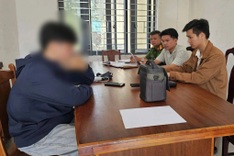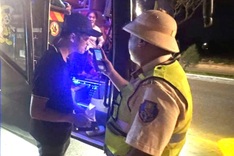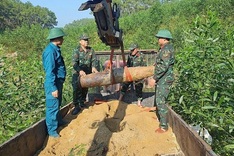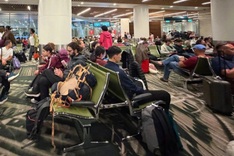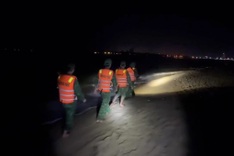As Lunar New Year approaches, contraband is at it's highest around provincial borders.

Smuggling goods transported by motorbike.
The destination for many smuggled goods is believed to be the Tinh Bien Border Gate in An Nong Commune, An Giang Province. Motorbikes and trucks are used to carry consumer commodities in preparation for Tet holiday. Goods such as telephones, candies, cookies, sugar, tobacco, shoes, alcohol and more are being smuggled across the country.
Most of these commodities are made in Thailand, according to L, a smuggler. They are transported by different means in order to avoid the police.
Looking down at rice fields from Xuan To Bridge in National Road No 91, many smuggling groups can be seen carrying goods across borders. They look like diligent ants carrying food to their homes.
After carrying goods from Cambodia, they will be brought to Vinh Te Channel where there are a lot of ships, said L. During dry seasons, ships cannot reach near the banks so smugglers often hire labourers to carry their goods to be loaded onto ships.
“When police do not patrol, our trucks carrying smuggled goods pass through borders easily. We have 3-4 trucks daily. But if there is any alarm, we will stay at home and wait for information. We always have a team watching each step of the patrolling police,” added L.
Runners also are in tough competition during Tet season because smugglers want to find those who have good health who know the way and can work at a low cost.
There are about 15 smuggler groups at Tinh Bien who work days and nights. They contraband over a dozen tonnes of goods everyday and will make tens of million of dong (thousands of dollars) if their deals are successful, according to L.
In addition to the Tinh Bien border gate, Vinh Nguon, Khanh Binh (An Phu) border gates are also busy with smuggling activities. They will be brought to Chau Doc Town, Ho Chi Minh City and other neighbouring areas.
According to L, smugglers at An Giang have unwritten rules to protect each other. When runners are arrested, they will not have to compensate money to the hirers, in turn, they will not tell police who hired them. When hirers are arrested, they will not tell police who they hired. This “fair play” rule makes it difficult for police to investigate.










